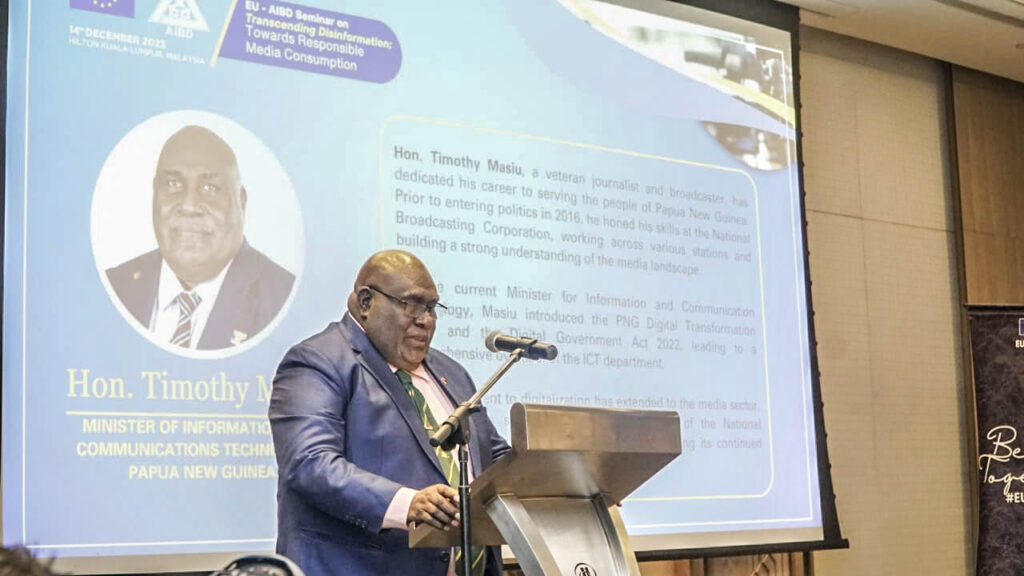AIBD / KIBA Seminar on Strategy for Internet Protocol Television (IPTV) : Korean Viewpoint ON 26 February 2018 at Kuala Lumpur

Internet Protocol Television (IPTV) is increasingly becoming popular around the globe. Millions of television viewers around the world are adopting the platform in an attempt to reclaim control of content and scheduling. The Fourth Industrial Revolution is set to bring a major transformation in technology and technological innovation that will fundamentally alter the way we live, work, and relate to one another. IP on broadcasting and IPTV will take a greater role in future delivery of contents in non-linear fashion very differently from traditional linear TV we are familiar with. Deliberation on IPTV strategy thus has gotten utmost importance for clear understanding and proper implementation of the technology.
IPTV, the delivery of television content over Internet Protocol (IP) networks offers streaming of the source media (or programming channels) continuously while maintaining quality of service. IPTV combines television and high-speed Internet into one system through a set-top box. Television content is delivered through high speed broadband connection instead of the traditional ways of transmission.
It is considered to be the next generation of communication and entertainment which promises more interactive TV experience for the viewers such as Video on Demand (VoD), movie downloads, electronic bank transaction and TV commerce.
The Asia-Pacific Institute for Broadcasting Development (AIBD), in collaboration with the Korea IPTV Broadcasters Association (KIBA) organised a one-day In-Country seminar on “IPTV Strategy” on 27 February 2018, in Kuala Lumpur Malaysia.
The Korea IPTV Broadcaster’s Association (KIBA) provided the experts to share their experience in implementing the IPTV in Korea. The Korean officials included Mr Park In Seo, Secretary General KIBA; Mr Koh Heungseok, Team Director, KIBA; Prof. Ha Ju Yong, Inha University, Korea; and Prof. Mo Jeonghoon, Yonsei University, Korea.
This seminar incorporated strategists with Malaysian counterparts to enhance media development besides sharing the Korean IPTV knowhow. Ms Emily Wee, Vice President, Business & Media Operations New Media/Chief Executive Office, TM Net Sdn Bhd Malaysia and Dr Amal Punchihewa Director, Technology & Innovation, Asia Pacific Institute for Broadcasting Development (ABU), Malaysia, joined in the panel discussion with Korean experts. The main topics of discussion were media convergence and technological development of Korea’s IPTV, the 4th Industrial revolution and IPTV future strategy besides history and change of Korean IPTV.
In the introductory session Mr Koh Heungseo explained that the aim of the KIBA (Korea IPTV Broadcasting Association) is to contribute to the development of digital media industries. KIBA takes an initiative in providing a platform for the innovative and integrated development of new media sectors. The “Smart Media Center” will be a hub of the open smart society where people from all walks of life can communicate and discuss over the future of digital convergence.
Prof. Ha Ju Yong in his sessions talked about the past, present and future of the broadcasting scenario in Korea. Korean Broadcasting System (KBS), Munha Broadcasting System (MBC), Seoul Broadcasting System (SBS) and Educational Broadcasting System (EBS) are the four major Over-the-Air terrestrial television service providers in the country. Prof. Ju Yong discussed about the early history of IPTV in Korea, progress of IPTV in the country, TV programmes offered by Pay-TV services, and the major factors that drove the IPTV success with a special emphasis on subscription shares in the Pay-TV market. He has mentioned that the high speed internet has permeated all aspects of society and this widespread adoption of the internet in South Korea coupled with the continued pace of development has resulted in an exciting digital economy enhancing the IPTV implementation.
Prof. Mo Jeonhoon in his sessions extensively explained the technology aspects of IPTV, techniques of digital compression and codecs, multicast technology and zapping issues. He discussed Over-The-Top (OTT) technology in comparison with IPTV and key technical challenges for IPTV in the country. Prof. Mo also talked about disruptive technology and disruptive innovation model explaining the pace of technological progress.




